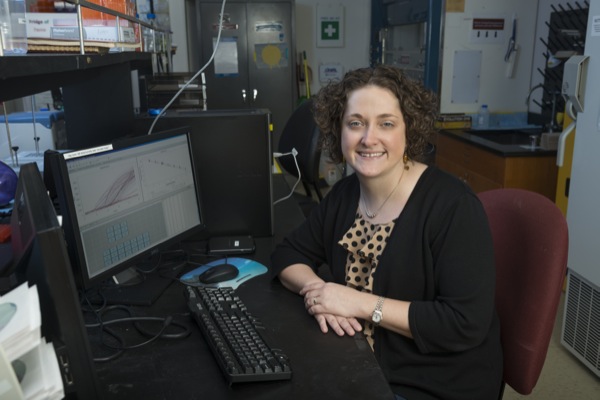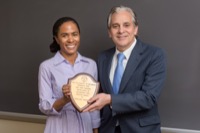
Impact Award
University's Tania Roth honored by brain sciences foundation
12:42 p.m., Feb. 9, 2015--Tania L. Roth, assistant professor of psychological and brain sciences at the University of Delaware, has received an Early Career Impact Award from the Federation of Associations in Behavioral and Brain Sciences (FABBS) Foundation.
Roth was nominated for the honor by the International Society for Developmental Psychobiology and will officially receive the award at the society’s annual meeting in July. She was selected as a recipient in recognition of her “major research contributions to the sciences of mind, brain and behavior,” FABBS said.
Honors Stories
National Medal of Science
Warren Award
Roth, a behavioral neuroscientist, studies what happens to the brain when stress occurs early in life, exploring how that experience can cause molecular changes to DNA. She works in the area of behavioral epigenetics, or the study of specific molecular modifications that change gene expression and produce short- and long-term effects on physiology and behavior.
Using a rodent model, Roth investigates the relationship between environmental experiences and life-long patterns of gene expression and behavior. Her work focuses on DNA methylation — a chemical change in the brain that is important for cell development and gene expression.
She has investigated the neurobehavioral basis of infant attachment to an abusive caregiver and has been part of a national consortium of researchers seeking to better understand posttraumatic stress disorder.
Roth has participated in brain awareness events and given lectures across the United States. Her work has been featured in numerous media outlets including The Scientist, Psychiatric News, Nature News Feature and Science magazine.
About FABBS and the FABBS Foundation
FABBS is a coalition of scientific societies that conducts advocacy on behalf of those societies in Washington, D.C.
Its sister organization, the FABBS Foundation, was established in 2004 to educate the public about the contributions of brain and behavioral sciences to the well-being of individuals and society.
The foundation’s activities include connecting scientists to teachers through the National Lab Network; posting educational videos and publishing materials for classroom use that highlight scientific advances; offering free Science Cafes that allow the public to learn about research and to meet leading scientists; and engaging young people in science through the USA Science and Engineering Festival.
Article by Ann Manser
Photo by Evan Krape








